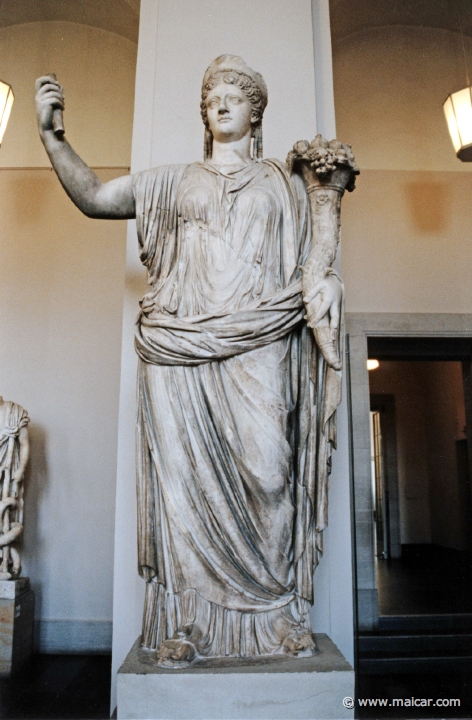|

|
Tyche, holding the horn of Amalthea or Horn of Plenty. 2132: Antonia, mother of the Emperor Claudius, holding the horn of plenty, 1C AD. Pergamon Museum, Berlin.
|
|
Tyche is Fortune, a powerful goddess who loves different and unpredictable ways, and permanently offers instructive examples to those who neither know nor expect the incredible changes which she can effect. Tyche is one of the OCEANIDS, but it has
also been claimed that she was one of the MOERAE, and the most
powerful of the sisters.
Tyche governs a vast realm
Not to be an outcast of Fortune is one of the
deepest desires of most men and women. For Tyche is
one of the mightiest divinities when it comes to
human affairs: Beauty and good reputation, they
say, are in Tyche's keeping, and even success in
love depends on Fortune. In fact, some believe that
most things depend on her, including such cardinal
things as health, wealth, power, good marriage, and
lovely children.
Dashing hopes
Now mortals, having great concern for such
achievements, put their hopes in Tyche each day and
each night. But on the other hand, Tyche's main
pleasure consists in dashing hopes. So, what
mortals might achieve and enjoy through years of
efforts, she may destroy in one single day by what
is called a "reversal of Fortune", a phenomenon
which is normally unpredictable, and that is often
regarded as "curious", for things may suddenly
appear upside-down. In this manner, great careers come to abrupt
ends. It does not matter how powerful, or rich, or
beautiful someone is when Fortune tries one of her
vicissitudes. For at any moment she may just make
him or her be seized by a desperate malady and die,
or she may bring to naught all achievements and
plans by other means. And when this happens, Tyche
is called "cruel" and "harsh"; and when things go
well, she is seen as giving "gifts", and is
therefore called "generous". But others call her
"uncertain", for no one knows what she will bring
next moment. It is known that arrogant people are hated among
gods and men, and for that reason it has been
considered adequate to be humble in front of this
goddess, abstaining from acts that go beyond man's
powers. For neither wisdom nor strength can prevail
over Tyche, who works swift changes in the
prosperity of men, showing that those who become
elated above measure, give proof of their own
weakness in the next turn, when she heaps upon them
whatever calamities she pleases.
Worthy use of good fortune
And Tyche being so changeable, there are those
who try to make a worthy use of their good fortune,
so that they may have friends to grieve with them
when Tyche is adverse, as well as friends that will
rejoice at their successes when Tyche is
favorable.
Compassion is not her business
The advantages that may be obtained in war are,
they say, determined by Tyche. Yet it is not her
duty to feel compassion for her victims, but
instead it is up to men not to inflict unbearable
outrages to other men. In war, they say, Fortune is
impartial, and the defeated must suffer what they
themselves have done to the unfortunate. Therefore,
those whose affairs prosper usually add clemency to
constant success, since it is known that those who
indulge in cruelty are fated to shorten their own
good fortune. For these reasons, it is also believed that
those who show leniency towards the misfortunes of
other men, reserve for themselves the hope of mercy
from all men. For Fortune changes fast, and life is
full with unexpected events like civil wars,
robberies, and other crimes. And it is easy to see
that he who excludes mercy when dealing with other
men, sets up a harsh law against himself, for all
time to come.
Trophies made of wood
The Greeks, some say, ordained that trophies of
war should be made of wood, so that the memorials
of enmity should last for a brief time. And they
did so because they understood that a slight turn
of Tyche brings the arrogant low, and that humane
treatment of the defeated gives occasion for
friendship.
|

|
3903 detail: Jan Breugel 1568-1625: Naiads filling the Horn of Plenty. Mauritshuis, Den Haag.
|
|
Suppliants of Fortune
All situations advise to use the prosperity
which Fortune gives for the benefit of other human
beings, and never waste it in barbarous savagery.
Those who act in such a ruinous way have no right
to blame Fortune later, or to become her
suppliants. For suppliants are called those who
have found Fortune unkind, but still are pure in
heart, and not those who have suffered serious
defeats because of their own wickedness and greed.
The greedy change their minds
There are those who are not satisfied with their
own gifts of Fortune, and some among them may even
covet those who belong to others. But when Fortune
robs one of them of the comforts he had enjoyed
until then, and threatening everything he has
achieved, becomes more and more bitter against him,
he usually thinks that he may as well be content
that at least he preserves his life. To such an
extent can Tyche change the thoughts of a man, who
only yesterday believed that he could conquer all
kind of riches.
Confusion of names and terms
Now, some have said that the world has a soul,
which is perfect intelligence and wisdom, and some
call it "God", and sometimes "Providence", because
it governs the heavens and also those things on
earth that concern mankind. But since everything
happens as ordained, they also thought that they
could call this soul "Necessity"
(Ananke), and since the
operations of this order are unforeseen and
unexpected, they came to the idea that Necessity
could be called Fortune. That is how the soul of
the world, God, Providence, Ananke, and Tyche came to
be confused and regarded as different denominations
of one and the same thing.
Grateful Palamedes
In any case, the Oceanid Tyche stands by
herself, usually holding the horn of plenty; for Wealth, they say, is
nursed by her. That is why, hoping for her
generosity, many cities built sanctuaries to her,
and in one of them Palamedes dedicated
the dice that he had invented.
The gift of Fortune
Others say that what lies outside the sphere of
the moral purpose, cannot be possessed by man, and
therefore everything should be surrendered to the
real owners, who are Fortune and the gods. That is
the only way to serenity, they assert. And men,
they add, look as if they loved toil, working as
they do night and day. But it is not industry and
toil they love, but instead reputation and gold.
And that is why some call them ambitious and
greedy, instead of industrious and hard-working.
However, what they may gain is the gift of Fortune,
which she herself takes away when she pleases.
Fortune without intelligence leads to ruin
It has also been said that gold, repute, health,
strength, beauty, and all other gifts of Fortune,
need to be commanded by a man's intelligence. For
through his intelligence, or as others put it, his
moral purpose, he becomes able to make good use of
all gifts, without depending on them. And without
intelligence, gold, repute, beauty, and other
wonderful gifts of Tyche, may act like poison and
destroy a man or a woman. This is, some affirm, what Prometheus 1 meant
when he advised his brother Epimetheus not to
welcome any gifts from Zeus, but instead always
return them. For the gifts of Tyche are external
advantages, and undeserved good fortune is a source
of misery for the unthinking.
|